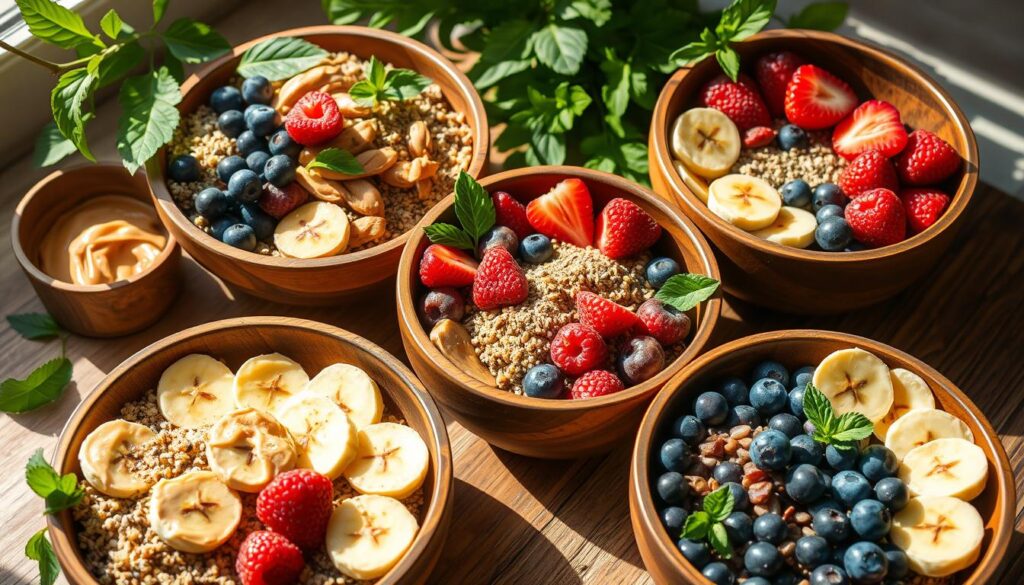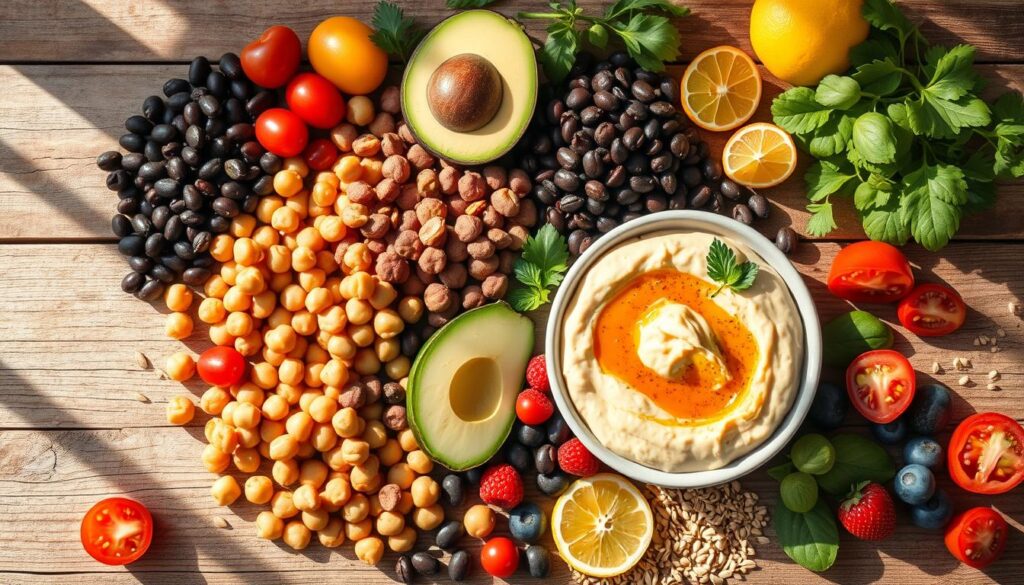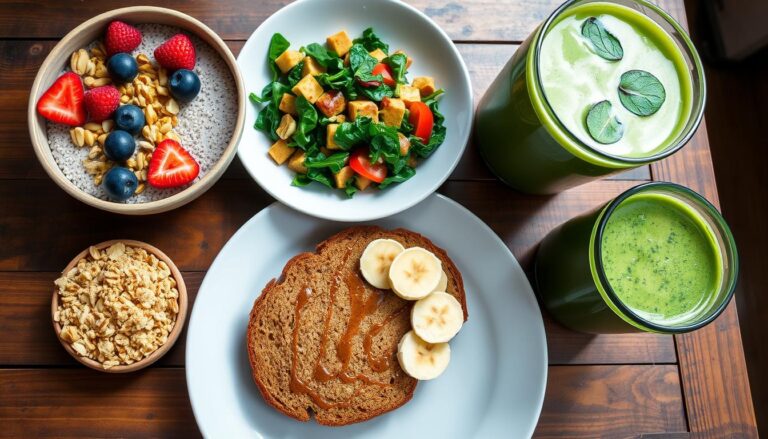Starting your day with a protein-rich breakfast can make a big difference. As a vegan, I’ve discovered that high-protein plant-based meals boost my energy and focus. I no longer feel tired or crave unhealthy snacks in the morning.
In this guide, I’ll share tasty vegan breakfast ideas full of plant-based protein. You’ll find everything from vegan pancakes and banana nut oatmeal to tofu scrambles and protein-packed smoothies. These recipes will make your mornings better and keep you full until lunch.
Let’s explore plant-based breakfast ideas that will make mornings easier. Get ready to see how a high-protein, energizing vegan meal can change your day.
Table of Contents
What Makes a Breakfast High in Protein?
Protein is key for your health and energy. Starting your day with a high-protein vegan breakfast is great. It boosts your energy and helps muscles recover.
The Importance of Protein in Your Diet
Protein helps fix tissues, supports your immune system, and controls hormones. Eating enough protein in the morning keeps you full and stable. It’s vital for vegans and vegetarians to get enough plant-based protein sources.
Best Plant-Based Protein Sources
For vegan protein requirements, mix different complete versus incomplete proteins. Complete proteins have all essential amino acids. Incomplete proteins lack one or more. Combining them ensures your body gets all the nutrients it needs.
- Tofu and tempeh
- Lentils, beans, and edamame
- Nuts and nut butters
- Seeds like chia, flax, and hemp
- Nutritional yeast
- Quinoa and other whole grains
Daily Protein Requirements for Vegans
Vegans need 0.8 to 1.0 grams of protein per kilogram of body weight. A 150-pound (68 kg) vegan should aim for 54-68 grams of protein daily. Adding various high-plant-based protein sources to your breakfast helps meet these needs.
Quick and Easy High Protein Vegan Breakfast Ideas
Mornings can be busy, but you don’t have to skip a healthy start. Find these fast and simple high protein vegan breakfast to energize you right away.
Overnight Oats with Nuts and Seeds
Overnight oats are perfect for quick mornings. Mix rolled oats, plant-based milk, and nuts and seeds like almonds, chia, and hemp. Refrigerate it overnight, and you’ll have a tasty, protein-rich breakfast ready.
Add fresh fruit on top for more nutrients.
Protein-Packed Smoothies
Protein-packed smoothies are another great breakfast choice. Blend plant-based milk, frozen fruit, greens, and plant-based protein like nut butter or tofu. This mix is full of nutrients and keeps you energized all morning.
Tofu Scramble Recipes
Try a tofu scramble for a savory breakfast. Crumble tofu and cook it with veggies, herbs, and spices. Add beans, lentils, or avocado for more protein.
Serve it alone or in a whole-grain wrap or on toast. It’s a filling meal.
Adding these quick and easy high protein vegan breakfast to your day starts it off right. You’ll feel energized, nourished, and ready for anything.
Delicious High Protein Vegan Breakfast Smoothies
Start your day with a nutritious vegan breakfast smoothie. These smoothies are tasty and full of nutrients to kickstart your morning. We’ll look at the best ingredients for a balanced smoothie and share two tasty recipes.
Ingredients for a Balanced Breakfast Smoothie
To make a high-protein vegan breakfast smoothie, use these ingredients:
- Plant-based protein powder (like pea, hemp, or soy)
- Creamy non-dairy milk (almond, oat, coconut, or soy)
- Nutrient-dense fruits (bananas, berries, mango, etc.)
- Leafy greens (spinach, kale, or Swiss chard)
- Healthy fats (nut butters, avocado, chia seeds, or flaxseeds)
Recipe: Banana Peanut Butter Protein Shake
This smoothie mixes banana and peanut butter with plant-based protein. The Chocolate Peanut Butter Tofu Smoothie has 40 grams of protein. It uses silken tofu, peanut butter, and hemp seeds.
Recipe: Berry Spinach Smoothie with Chia Seeds
This smoothie is full of antioxidants, fiber, and protein. It has berries and leafy greens. Chia seeds add protein, omega-3s, and fiber for energy.
Feel free to change these smoothie recipes. Try different milks, butters, fruits, and greens. The goal is to find a mix that tastes great and gives you energy.
Plant-Based Protein-Packed Breakfast Bowls
Start your day with a nutritious plant-based breakfast bowl. These meals are packed with protein and keep you energized. They’re perfect for fueling your body in the morning.
Creating Your Own Breakfast Bowl
Breakfast bowls are great because you can make them your own. Mix different plant-based ingredients for a meal that’s balanced and tasty. Here are some key parts to think about when making your own protein-rich bowl:
- Whole Grains: Pick grains like quinoa, brown rice, or oats for complex carbs and fiber.
- Plant-Based Proteins: Use tofu, tempeh, legumes, or nuts and seeds for protein.
- Fruits and Vegetables: Add berries, leafy greens, sweet potatoes, or avocado for extra nutrients.
- Healthy Fats: Add avocado, olive oil, or nut butters for good fats.
- Flavor Boosters: Try spices, herbs, and condiments to make your bowl unique.
Recipe: Quinoa Breakfast Bowl
Try a Quinoa Breakfast Bowl for a protein-rich start. Quinoa is a superfood with protein, fiber, and minerals. Mix it with plant-based milk, nuts, seeds, and fruit for a great morning meal.
Recipe: Sweet Potato and Black Bean Bowl
For a savory breakfast, try a Sweet Potato and Black Bean Bowl. It has complex carbs from sweet potatoes and protein from black beans. Add avocado, greens, and spices for a filling breakfast.

“By starting your day with a nutrient-dense, plant-based breakfast bowl, you’re setting yourself up for sustained energy and better overall health.”
Nutrient-Dense Vegan Pancakes and Waffles
Start your day with a boost of plant-based protein. Make delicious vegan pancakes and waffles. Use chickpea flour and almond flour to add protein to your breakfast.
Ingredients That Boost Protein Content
Look for these protein-rich ingredients for your batter:
- Chickpea flour: It adds protein, fiber, and complex carbs for a satisfying meal.
- Almond flour: This gluten-free flour is packed with protein, healthy fats, and vitamins.
- Chia seeds: Add these seeds for more protein, fiber, and omega-3s.
Recipe: Almond Flour Pancakes
Enjoy the nutty taste and soft texture of almond flour pancakes. They’re easy to make with just 3 ingredients. Perfect for a relaxed morning.
Recipe: Chickpea Flour Waffles
Try chickpea flour waffles for a twist on traditional waffles. They’re full of protein and fiber, making them a nutritious breakfast choice.
“These chickpea flour waffles are a game-changer! They’re so fluffy, yet packed with protein to keep me fueled through the morning.”
Get creative with toppings and syrups to make your vegan pancakes and waffles even tastier. Tailor them to your liking.
The Role of Legumes in Your Breakfast
Looking to boost your vegan breakfast with protein? Legumes like lentils and black beans are perfect. They’re full of plant-based protein, complex carbs, and fiber. These ingredients make your breakfast both nutritious and filling.
Why Legumes Are a Great Protein Source
Legumes, such as lentils, black beans, and chickpeas, are rich in plant-based protein. They have all the amino acids your body needs, making them a complete protein. Adding legumes to your legume-based breakfast helps meet your protein needs and keeps you energized all morning.
Recipe: Lentil Breakfast Hash
Try our Lentil Breakfast Hash for a protein-packed start. It mixes lentil patties with roasted sweet potatoes, bell peppers, and onions. The lentils give a meaty texture, while the veggies add color and flavor. Add avocado or a poached egg for extra nutrients.
Recipe: Black Bean Breakfast Tacos
Begin your day with Mexican-style black bean breakfast tacos. Cook black beans with spices, then fill warm corn tortillas with them. Top with diced tomatoes, avocado, and vegan cheese or cashew cream. This breakfast is protein-rich and will keep you full until lunch.
Adding legumes to your breakfast is a smart way to increase plant-based protein. Whether you choose lentil patties hash or black bean breakfast tacos, these ingredients are packed with nutrients. They help power your day and support your health.

Creative Ways to Use Tofu and Tempeh
Tofu and tempeh are great for adding protein to your breakfast. They are both made from soy but have different tastes and textures. Knowing the difference can help you pick the right one for your meals.
Tofu vs. Tempeh: Which Is Better?
Tofu is made by coagulating soy milk and pressing it into a block. It has a mild taste and a soft texture. This makes it perfect for soaking up flavors.
Tempeh, on the other hand, is a firm, cake-like patty made from fermented soybeans. It tastes nutty and earthy, with a chewy texture.
Both tofu and tempeh are good for protein. But tempeh has more fiber and probiotics because of fermentation. Tofu is lower in calories and carbs. Your choice depends on what you like and what you’re making.
Recipe: Savory Tofu Breakfast Burrito
Begin your day with a tofu scramble burrito. It’s packed with protein. Crumbled tofu is cooked with onions, bell peppers, and spices, then wrapped in a tortilla.
This recipe was first shared on February 15, 2021, and updated on May 28, 2024. It makes six servings and takes 30 minutes to make. The tofu scramble keeps well in the fridge for 3-4 days but doesn’t freeze well.
Recipe: Tempeh Bacon Sandwich
Try our tempeh bacon for a vegan bacon sandwich. Thin tempeh slices are marinated and pan-fried until crispy. Top it on a vegan breakfast sandwich with your favorite toppings for a protein-rich breakfast.
Exploring Plant-Based Protein Powders
Plant-based protein powders are getting more popular for fueling your body. You can find pea, hemp, and brown rice options. These supplements are great for adding protein to your vegan breakfasts.
Types of Vegan Protein Powders
The main types of vegan protein powders are:
- Pea Protein: Made from yellow split peas, it’s a complete protein that’s easy to digest.
- Hemp Protein: From hemp seeds, it’s full of protein, fiber, and healthy fats.
- Brown Rice Protein: Hypoallergenic and easy to digest, it’s rich in amino acids.
- Soy Protein: A complete protein, soy-based powders are a classic choice.
How to Incorporate Protein Powder into Breakfast
Adding protein-packed oats or vegan protein powders to your breakfast boosts its nutrition. Mix a scoop into smoothies, overnight oats, or baked goods. These plant-based supplements let you tailor your breakfast to your liking.
Recipe: Protein-Packed Overnight Oats
Begin your day with Protein-Packed Overnight Oats. This recipe combines oats, vegan protein powder, chia seeds, and plant-based milk. It’s a healthy and easy breakfast option.
“Starting your day with a high-protein breakfast supports your health and fitness goals. It combines carbs, fiber, and protein for energy and satisfaction.”
High Energy Vegan Breakfast Bars
Start your day with a burst of energy by making your own vegan breakfast bars. These treats are delicious and give you energy all morning. They’re great for busy mornings or when you need a quick breakfast.
Making Your Own Breakfast Bars
By making your own vegan breakfast bars, you choose what goes in them. It’s cheaper and healthier than store-bought bars. Plus, you avoid additives and preservatives.
Ingredients for Balanced Energy
To make the best no-bake protein snacks, mix nutrient-rich ingredients. Look for complex carbs, healthy fats, and plant proteins. Some good ingredients are:
- Nuts and seeds (like almonds, pumpkin seeds, or chia seeds) for heart-healthy fats and fiber
- Dried fruits (such as dates, apricots, or cranberries) for natural sweetness and quick energy
- Oats or quinoa for sustained carbohydrate release
- Plant-based protein powders or nut butters for an extra protein boost
Recipe: No-Bake Protein Bars
Try this easy no-bake protein bars recipe for a quick, nutritious breakfast:
- In a food processor, blend 1 cup of rolled oats, 1/2 cup of almonds, and 1/4 cup of pumpkin seeds until a coarse flour forms.
- Add 1/2 cup of pitted dates, 1/4 cup of almond butter, 2 tablespoons of maple syrup, and a pinch of salt. Pulse until the mixture starts to come together.
- Press the mixture into an 8×8-inch baking pan lined with parchment paper and refrigerate for at least 30 minutes.
- Cut the chilled bars into 6 equal pieces and enjoy as a quick and satisfying vegan breakfast bar.
These homemade energy bars are great for meal prep. Store them in the fridge for up to 5 days. They’re a healthy breakfast option all week.
Preparing High Protein Vegan Breakfast in Advance
Busy mornings can make it hard to stick to a healthy vegan diet. But, with some meal prep, you can enjoy tasty and nutritious vegan breakfasts on the go. Try batch cooking grains and legumes, and pre-chopping fruits and veggies. These simple steps save time and ensure a protein-rich start to your day.
Meal Prep Tips for Busy Mornings
- Batch cook grains like quinoa, brown rice, or oats to have them ready to go.
- Prepare a big batch of plant-based protein sources like tofu, tempeh, or lentils.
- Chop and store fresh fruits and vegetables for easy assembly.
- Make a big batch of nut or seed butters to have on hand.
- Prepare smoothie packs by portioning out ingredients in advance.
Best Containers for Storage
Choosing the right containers is crucial for keeping your vegan breakfasts fresh. Use airtight glass or BPA-free plastic containers for cooked grains, proteins, and chopped produce. For smoothie packs, resealable freezer bags or small jars work best. This keeps your ingredients’ nutritional value and texture intact.
Quick Reheat Ideas for Breakfast Meals
When it’s time to enjoy your pre-prepped breakfast, a few quick reheating methods can help. For porridge or oatmeal, add plant-based milk and microwave or reheat on the stovetop. Frittatas, hash, and breakfast burritos can be warmed in the oven or toaster oven. With some planning, you can have a nourishing vegan breakfast ready in minutes.
“Meal prepping is a game-changer for busy mornings. With just a little time on the weekend, you can set yourself up for a week of high protein vegan breakfast that will power you through the day.”
The Benefits of Eating High Protein Breakfasts
Starting your day with a high-protein vegan breakfast has many benefits. It boosts your energy and mood all day long. This is because protein helps you stay focused and satisfied.
How Protein Affects Energy and Mood
Protein is key for lasting energy. It takes more energy to digest than carbs and fats. Eating 15 to 30 grams of protein at breakfast keeps your blood sugar stable.
This leads to better focus and satisfaction. Plus, a high-protein breakfast boosts GLP-1 levels. This hormone helps control hunger and mood.
Long-Term Health Benefits
Eating a plant-based diet with plenty of protein is good for your health. Protein helps build and repair muscles. This improves muscle strength and health.
Also, eating a bit more protein can help you make healthier food choices. This supports your overall well-being.
Encouraging Sustainable Eating Habits
Starting your day with a high-protein vegan breakfast promotes sustainable eating. It makes you more likely to choose healthy foods all day. This leads to a balanced and consistent plant-based diet.
This is good for your health and the environment. It helps you make better food choices and live more sustainably.
